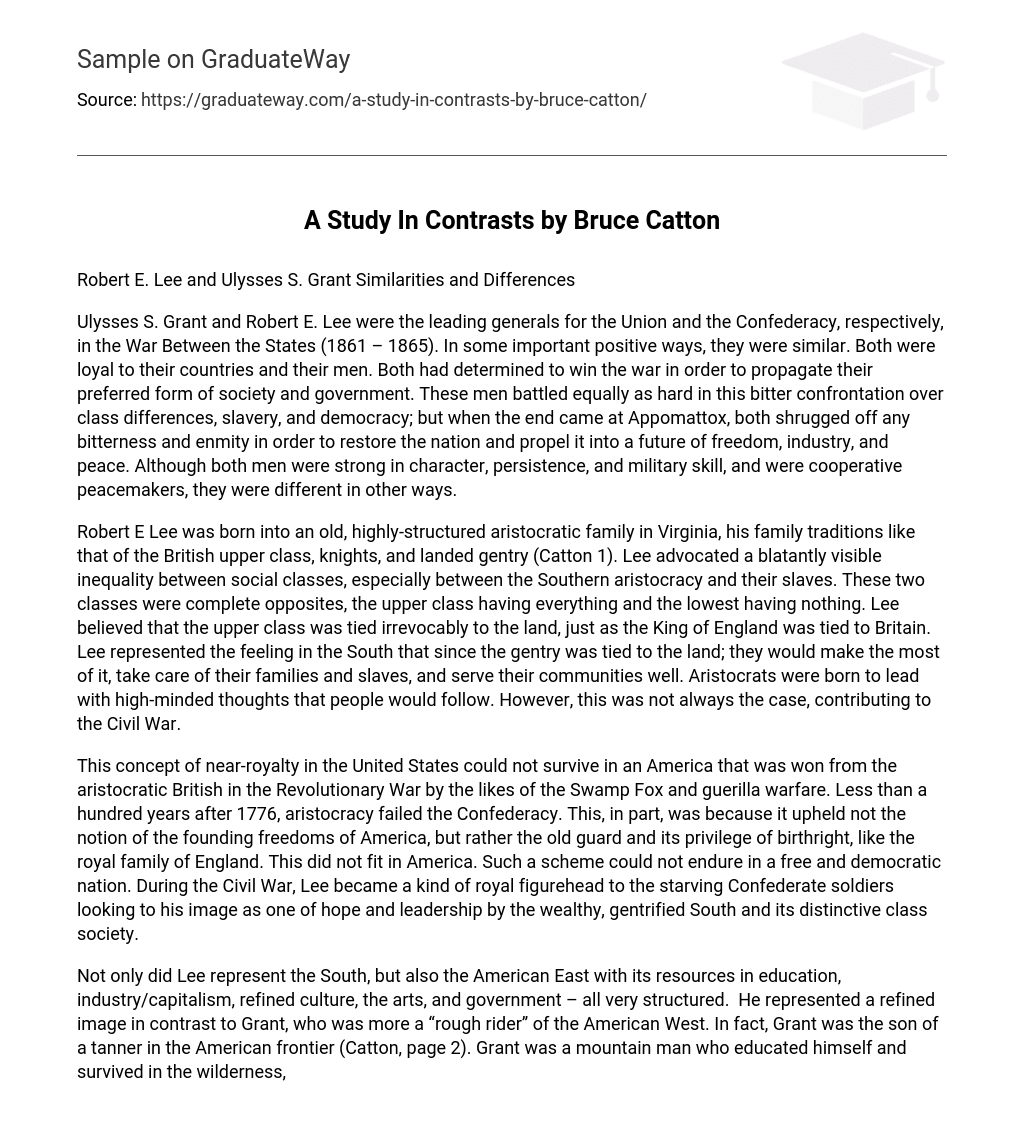Ulysses S. Grant and Robert E. Lee were the leading generals for the Union and the Confederacy, respectively, in the War Between the States (1861 – 1865). In some important positive ways, they were similar. Both were loyal to their countries and their men. Both had determined to win the war in order to propagate their preferred form of society and government. These men battled equally as hard in this bitter confrontation over class differences, slavery, and democracy; but when the end came at Appomattox, both shrugged off any bitterness and enmity in order to restore the nation and propel it into a future of freedom, industry, and peace. Although both men were strong in character, persistence, and military skill, and were cooperative peacemakers, they were different in other ways.
Robert E Lee was born into an old, highly-structured aristocratic family in Virginia, his family traditions like that of the British upper class, knights, and landed gentry. Lee advocated a blatantly visible inequality between social classes, especially between the Southern aristocracy and their slaves. These two classes were complete opposites, the upper class having everything and the lowest having nothing. Lee believed that the upper class was tied irrevocably to the land, just as the King of England was tied to Britain. Lee represented the feeling in the South that since the gentry was tied to the land; they would make the most of it, take care of their families and slaves, and serve their communities well. Aristocrats were born to lead with high-minded thoughts that people would follow. However, this was not always the case, contributing to the Civil War.
This concept of near-royalty in the United States could not survive in an America that was won from the aristocratic British in the Revolutionary War by the likes of the Swamp Fox and guerilla warfare. Less than a hundred years after 1776, aristocracy failed the Confederacy. This, in part, was because it upheld not the notion of the founding freedoms of America, but rather the old guard and its privilege of birthright, like the royal family of England. This did not fit in America. Such a scheme could not endure in a free and democratic nation. During the Civil War, Lee became a kind of royal figurehead to the starving Confederate soldiers looking to his image as one of hope and leadership by the wealthy, gentrified South and its distinctive class society.
Not only did Lee represent the South, but also the American East with its resources in education, industry/capitalism, refined culture, the arts, and government – all very structured. He represented a refined image in contrast to Grant, who was more a “rough rider” of the American West. In fact, Grant was the son of a tanner in the American frontier. Grant was a mountain man who educated himself and survived in the wilderness, able to endure by his wits, intelligence, and strength. This very upbringing helped him persevere to the end of the Civil War without surrender, outlasting the Confederacy.
For such men as Grant and other pioneering frontier and mountain men, life was a contest against other men, all of whom deserved nothing from birth and everything to how hard they worked in life and how far they participated in a democratic government. Grant did not inherit any aristocratic or royal position in society. He and other frontiersmen worked their land themselves, hiring help when able, but not using slaves. Grant believed that the slaves were men and women like any others and should be free. He came from a classless society in the West
where everyone worked hard and worked together to survive. The aristocracy, to him, was a luxury that could not work in America, which had its greatest part yet to be settled in the Wert.
Despite these differences, there were other similarities between Generals Lee and Grant. Both were noble men – Lee from birth and good intentions and Grant from character-building hard work. Both enjoyed Lee’s sense of loyalty to community. Grant felt this as well; as did the larger number of Western pioneers who put massive efforts into building their farms from dirt, and running businesses that tied them to their lands like a strong anchor, encouraging them to value community as a means of group survival and commerce. However, Grant’s community, because the West was wide and sparsely populated, was the entire United States, whereas Lee’s was a narrower plane, including his hometown and Virginia commonwealth. Lee’s community was changing somewhat with advancements in business and education, while the West was changing immensely and would continue in large-scale development for some time. Grant and Lee were both noble and skilled, and shared a sense of community, but they were importantly different. Robert E. Lee was a picture of finery and old class traditions, while U.S. Grant was the image of trail dust and farmer’s earth on a modern explorer with a larger worldview. President Grant took a united America into the future.
Works Cited
Catton, Bruce. Grant and Lee: A Study in Contrasts. p. 1-3. Originally in The American Story
(collection of papers). Ed. Garet Garrett. Chicago, Regenery, 1955.





